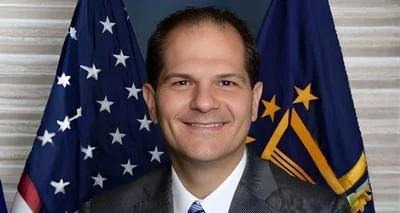Illinois Capitol
Illinois Capitol
Illinois' billion-dollar pension debt could rise by millions if two Democrats' pension bills are approved by the Senate and Gov. Bruce Rauner.
Introduced at the April 27 House floor debate, HB4659, sponsored by Rep. Robert Martwick (D-Chicago), and HB5183, sponsored by Rep. Dan Burke (D-Chicago), passed and could add millions more to the state’s pension debt, a notion neither Rep. Peter Breen (R-Lombard) or Rep. Jeanne Ives (R-Wheaton) obstinately objected to.
Breen first addressed HB4659 -- which alters the Illinois Pension Code and removes a birthdate restriction for Chicago police officers to be eligible at 55 years old for a 3 percent annual increase in retirement allowance that is subject to a 30 percent maximum increase -- saying the $47 million hit to the present pension plan is wildly irresponsible.

Rep. Peter Breen (R-Lombard)
“One might take the more cynical view that those pensions aren’t going to be paid anyway, so who cares how much of a hit we throw at them, each year, on and on and on,” Breen said.
However, to be fiscally responsible, any further burden or benefit increase cannot happen, said Breen, who added in four to five years, headline news will be Chicago’s bankruptcy.
Ives wanted to know when lawmakers were going to end pension issues.
“We are once again enhancing benefits, benefits we already can’t pay for,” Ives said.
At a 20 percent unfunded liability, Chicago can’t take another pension hit, said Ives, who like Breen said the future looks bleak.
“In four years when all this goes to hell in a handbasket in Chicago, just watch what happens,” Ives said.
To drive her point home, Ives informed the House members that the Illinois Supreme Court recently overruled the lower courts ruling on the City of Harvey's intercept law, which now allows for Comptroller Susana Mendoza to withhold state tax revenue that would be reimbursed to Harvey but may not due to its unfunded pension liability.
“It doesn’t matter if we are going to have to lay off police and fire to do so, we are going to have to pay for pensions and benefits we gave out 30 years ago,” Ives said.
Repeating the same, Ives said HB5183, which would increase the amount of the minimum pension annuity for specific firemen and the minimum widow's annuity from 125 percent to 150 percent of the federal poverty level, is yet another way to bankrupt municipalities.
“Make no doubt about it, this is a serious matter and you are dealing with peoples’ lives,” Ives said.
The pension funds are on the brink of insolvency, she added.
“And there is no way out,” Ives said.
Using Danville, Virginia, as an example, Ives said she recently received a letter from Mayor John Gilstrap saying the municipality meets bankruptcy requirements.
“The cost of their pension funds has increased 112 percent over the last five years and they have $105 million in debt, and they have no idea what they are going to do,” Ives said.
Also scrutinizing the bill, Breen said lawmakers could not print money for the “happy” kind of pension enhancement bills Democrats continue to propose.
“I am sure there are perfectly good reasons to do it for a solvent pension fund; but in this particular case, this pension fund is going down and it is just a matter of time when,” Breen said.
Both bills passed the House, with HB4659 at 60-42 and HB5183 at 56-40. They will move to the Senate for debate and vote.






 Alerts Sign-up
Alerts Sign-up